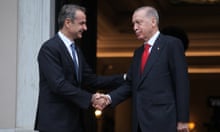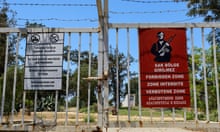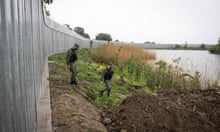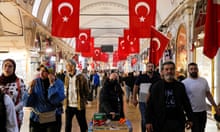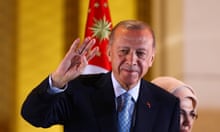An EU plan to impose additional sanctions on Turkey will backfire and only make the chance of reaching agreement over the growing Greek-Turkish contest in the Eastern Mediterranean regarding gas resources more difficult, the chief adviser to the Turkish president has warned.
The adviser to Recep Tayyip Erdoğan, Ibrahim Kalin, urged the EU not to allow its agenda “to be reduced or hijacked by one or two countries”, a reference to Greece, Cyprus and France, the EU countries pushing hardest for strong sanctions to stop Turkey exploring for gas in Cypriot waters. Kalin said on Wednesday: “Sanctions will not work. It will produce the reverse effect. Everyone will lose at the end of the day.”
A draft sanctions plan due to be put to EU leaders on Thursday proposes sanctions on Turkish companies and individuals responsible for drilling in the contested waters. But it says detailed plans would need to be drawn up by the EU external affairs chief, Josep Borrell, between now and the next EU leaders’ meeting in March, giving mediators another three months to see if talks can secure a solution.
The proposal would allow the EU to “prepare additional listings” on the basis of a sanctions list already in place since 2019 and “if need be, work on the extension” of its scope.
France, in conjunction with Greece, has been pressing for earlier and broader “sectoral” sanctions on the Turkish economy.
Germany has been acting as a mediator and has been pressing Turkey not to send its exploration ship Oruç Reis into Greek waters. The ship was first withdrawn in September after German pressure, but then on 12 October Turkey returned the ship to the southern coast of the Greek island of Kastellorizo, just off southern Turkey. The ship was withdrawn again on 30 November.
Kalin said Turkey had been expecting after the latest pullback of Oruç Reis that talks between Turkey and Greece could begin, but Greece had refused to talk until after the EU summit. Turkey is calling for a comprehensive eastern Mediterranean energy and gas conference to discuss rival claims to drilling rights. “We are ready to talk to everyone without preconditions,” he said.
The broader concern is that France, in alliance with Greece, Egypt, the United Arab Emirates and Cyprus, is trying to assemble a hard-edged alliance against Turkey. The French president, Emmanuel Macron, is increasingly at loggerheads with Turkey over its role in Cyprus, its interventions in Libya and more broadly over the extent to which Turkey has become a standard-bearer for the Muslim Brotherhood across the Middle East.
France has conducted joint military exercises with Greece, Italy and Cyprus to send a warning to Turkey. Macron has called for a Pax Mediterranea to combat Erdogan’s “imperial fantasies”.
The incoming Joe Biden administration is unlikely to make the gas dispute one of its top five foreign policy priorities. But during the election campaign, Biden said: “The Trump administration must press Turkey to refrain from any further provocative actions in the region against Greece, including threats of force, to create the space for diplomacy to succeed.”
James Jeffrey, a former US ambassador to Turkey and the US special envoy in Syria, said this week: “It is really hard to point to a way forward. We are dealing with pent-up biases and antagonisms on both sides, and we are dealing with a unique and very dominant personality in President Erdoğan.”


